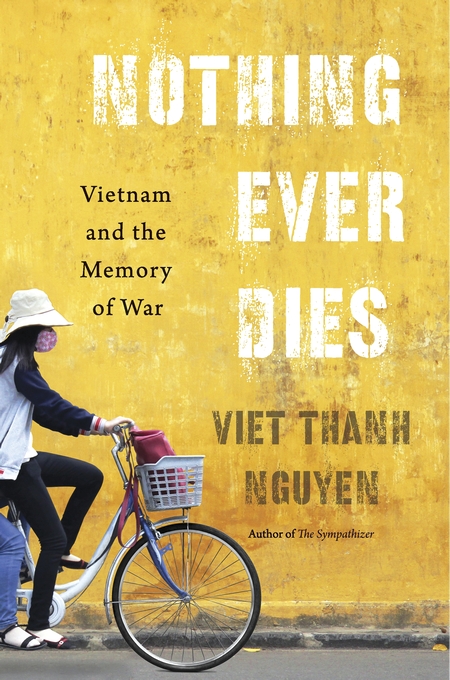Australia’s Vietnam War – and keeping it in context: others in the series
________________________________
Nothing Ever Dies: Vietnam and the Memory of War, Harvard University Press, Cambridge MA, 2016
This is the final post in our series ‘Australia’s Vietnam War – and keeping it in context‘. Each of our posts has tried to provide a balance to the focus of Australian officials and veterans’ spokespersons on remembering the exploits and fate of Australian soldiers. We have looked at the impacts of the war on the Vietnamese people, the effects of Agent Orange on civilians as well as on soldiers, the complex story – and myth – of what happened to Australian soldiers when they came home, the politics and ethics of the Long Tan commemoration as planned and as it turned out, Australian opposition to the war, and the role of Australian nurses in the war.
The view from a Vietnamese American
 Today we look at a recently published book by Vietnamese-American academic and Pulitzer Prize winner, Viet Thanh Nguyen. The book, Nothing Ever Dies: Vietnam and the Memory of War, underlines that, while Australia’s Vietnam War was a big deal in Australia this week, it was really only a very small part of a long and bloody conflict – running from 1954 to 1975 by one reckoning – which affected other people far more than it affected us, even taking account of the 521 Australian deaths and the many other personal tragedies that were and are being played out in our wide brown land.
Today we look at a recently published book by Vietnamese-American academic and Pulitzer Prize winner, Viet Thanh Nguyen. The book, Nothing Ever Dies: Vietnam and the Memory of War, underlines that, while Australia’s Vietnam War was a big deal in Australia this week, it was really only a very small part of a long and bloody conflict – running from 1954 to 1975 by one reckoning – which affected other people far more than it affected us, even taking account of the 521 Australian deaths and the many other personal tragedies that were and are being played out in our wide brown land.
The blurb of the book goes beyond promotion to make some strong points:
All wars are fought twice, the first time on the battlefield, the second time in memory … At stake are ethical questions about how the war should be remembered by participants that include not only Americans and Vietnamese but also Laotians, Cambodians, South Koreans, and Southeast Asian Americans. [Note: no mention of Australians.]
Too often, memorials valorize the experience of one’s own people above all else, honoring their sacrifices while demonizing the “enemy”— or, most often, ignoring combatants and civilians on the other side altogether. Visiting sites across the United States, Southeast Asia, and Korea, Viet Thanh Nguyen provides penetrating interpretations of the way memories of the war help to enable future wars or struggle to prevent them.
Drawing from this war, Nguyen offers a lesson for all wars by calling on us to recognize not only our shared humanity but our ever-present inhumanity. This is the only path to reconciliation with our foes, and with ourselves. Without reconciliation, war’s truth will be impossible to remember, and war’s trauma impossible to forget.
The link above includes extracts from the book, interviews and discussions with the author, and biodata. In one interview with Tavis Smiley, Viet Thanh Nguyen says most Americans ‘knew nothing’ of what had happened to the Vietnamese people, three million of whom died, plus another three million in Cambodia and Laos. The same could be said of many Australians, as they have responded (to varying degrees) to official and media invocations of Long Tan and other events in Vietnam.
The view from Anzac Parade, Canberra
Insisting on putting an Australian war in context is not always popular. At the official level, Australia is not good at it, certainly. Honest History said this in our Alternative Guide to the Australian War Memorial, which has been downloaded 1542 times since Anzac Day:
This Alternative Guide wants to help change public expectations of the Memorial. Look, for example, at the definition of “Australian military history”’ in section 3 of the Memorial’s Act: “the history of: (a) wars and warlike operations in which Australians have been on active service, including the events leading up to, and the aftermath of, such wars and warlike operations; and (b) the Defence Force”.
Reading this, you might think that “the history of … wars” would include something about why these wars occurred, the experience of the people Australians fought against (as well as of Australians), and the effects of war on Australia and other countries. Yet the Memorial’s “Mission”, as set out in its Corporate Plan, is a lot narrower than the words in the Act. It says this: “To assist Australians to remember, interpret, and understand the Australian experience of war and its enduring impact on Australian society” (emphasis added).
Does this emphasis on “the Australian experience of war” and its “impact on Australian society” allow the Memorial to take a parochial, Australia-centric view, ignoring the rest of the world? Should the Memorial focus more broadly?
 Australian War Memorial promotion
Australian War Memorial promotion
Some people might say that it is inappropriate, at times like Long Tan week, to refer to broader contexts. Honest History always starts from the position that every death in war is a tragedy, as is every instance of suffering as a result of war. Part of the ‘shared humanity’ that Viet Thanh Nguyen refers to is common victimhood. It is important not to allow misplaced sensitivity to excuse the ignoring of context. The more that one-sided, parochial interpretations of our history are allowed to dominate the field, the less room there is for balanced alternative interpretations.
20 August 2016


Leave a Reply
You must be logged in to post a comment.